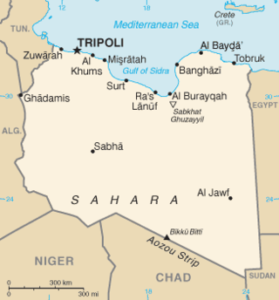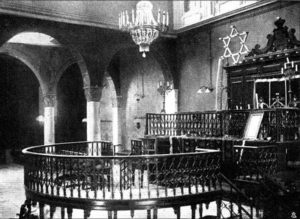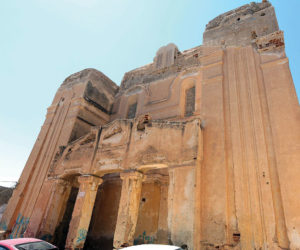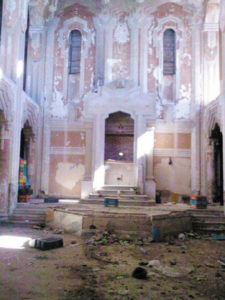 Jewish Population
Jewish Population
1948: 40,000 | 2002: 0
Libya’s Jews can trace their history back some 2,500 years, long before Arab tribes ever settled the territory. Jews prospered in the region which was then called Cyrenaica. Libya was invaded first by the Muslims and then by the Ottoman Empire, and the Jews lived as “dhimmi”- that is, protected non-Muslims. During the Ottoman period, Jewish families from Tripoli were attracted to Benghazi. This period gave new life and impetus to the Libyan Jewish community.
In the 18th and 19th centuries Benghazi had 400 Jewish families divided into two groups, those of the town and the surrounding region and those who were born in Tripoli and Italy, they both recognised the authority of one rabbi, but each had its own synagogue. In 1903, the records of the Alliance Israelite Universelle show 14,000 Jews living in Tripoli and 2,000 in Benghazi.
 In 1911, Libya was colonised by Italy. By 1931, there were 21,000 Jews living in the country, mostly in Tripoli. Libyan Jews enjoyed mostly positive conditions under the Italian occupation of Libya from 1911 until the late 1930s. At that time, most of the community was in Tripoli. In the late 1930s, Fascist anti-Semitic laws were progressively applied in the colony. Nevertheless, in 1941, the Jews still made up a quarter of the population of Tripoli and maintained 44 synagogues throughout the country. In 1942, Nazi German troops occupied the Jewish quarter of Benghazi, looted stores, destroyed Jewish homes, and deported more than 2,000 Jews to concentration camps, where more than one-fifth of them perished. Many Jews from Tripoli were sent to the Giado concentration camp, approximately 240 km south of Tripoli.
In 1911, Libya was colonised by Italy. By 1931, there were 21,000 Jews living in the country, mostly in Tripoli. Libyan Jews enjoyed mostly positive conditions under the Italian occupation of Libya from 1911 until the late 1930s. At that time, most of the community was in Tripoli. In the late 1930s, Fascist anti-Semitic laws were progressively applied in the colony. Nevertheless, in 1941, the Jews still made up a quarter of the population of Tripoli and maintained 44 synagogues throughout the country. In 1942, Nazi German troops occupied the Jewish quarter of Benghazi, looted stores, destroyed Jewish homes, and deported more than 2,000 Jews to concentration camps, where more than one-fifth of them perished. Many Jews from Tripoli were sent to the Giado concentration camp, approximately 240 km south of Tripoli.
 Some of the worst anti-Jewish violence occurred in the years following the liberation of North Africa by Allied troops. From 5 to 7 November 1945, more than 140 Jews were killed and many more injured in a pogrom in Tripolitania. The rioters looted nearly all of the city’s synagogues and destroyed five of them, along with hundreds of homes and businesses. In June 1948, anti-Jewish rioters killed another 12 Jews and destroyed 280 Jewish homes. This time, however, the Libyan Jewish community had prepared to defend itself. Jewish self-defence units fought back against the rioters, preventing more deaths.
Some of the worst anti-Jewish violence occurred in the years following the liberation of North Africa by Allied troops. From 5 to 7 November 1945, more than 140 Jews were killed and many more injured in a pogrom in Tripolitania. The rioters looted nearly all of the city’s synagogues and destroyed five of them, along with hundreds of homes and businesses. In June 1948, anti-Jewish rioters killed another 12 Jews and destroyed 280 Jewish homes. This time, however, the Libyan Jewish community had prepared to defend itself. Jewish self-defence units fought back against the rioters, preventing more deaths.
An increasing sense of insecurity, combined with the founding of the State of Israel, pushed many Jews to leave the country. In 1948, another pogrom occurred, inspired by Libyan nationalists impatient for independence from the British rule. A quick British response and Jewish self-defense limited the damage, but still, 15 Jews were killed and hundreds were left homeless. Although emigration was illegal, more than 3,000 Jews succeeded in leaving Libya, with many settling in Israel. In 1949, when finally, the British authorities allowed the emigration, more than other 30,000 Jews fled from Libya.
In 1951, Libya became an independent kingdom. In 1961, only ten years later, a new law required a special document to certify Libyan citizenship. Practically, all Jews were denied this document. By this time, Libyan Jews had been deprived of many civil rights: they could not vote, could not hold public office, could not serve in the army, could not obtain passports or purchase real property, could not obtain majority ownership in any new or old business, and were not even allowed to manage their own communal affairs.
 After the June 1967 Arab-Israeli Six-Day-War, Libyans too took to the streets and attacked the Jewish community, which had decreased to 7,000. When these anti-Semitic riots begun, King Idris himself with other international Jewish leaders urged Jews still living in Libya to emigrate. Eighteen Jews were killed, and the death toll might well have been greater but for the Italian ambassador to Libya who instructed all Italian diplomatic missions to offer their assistance and protection to Libya’s Jews. Subsequently, an Italian airborne operation relocated 6,000 Jews, mainly to Rome. These refugees were forced to leave behind their homes, businesses and possessions. When Muammar al-Gaddafi came to power in 1969, there were only 100 Jews left in Libya. Even though his government confiscated all Jewish property and prohibited Jews from emigrating, some Jews still managed to leave.
After the June 1967 Arab-Israeli Six-Day-War, Libyans too took to the streets and attacked the Jewish community, which had decreased to 7,000. When these anti-Semitic riots begun, King Idris himself with other international Jewish leaders urged Jews still living in Libya to emigrate. Eighteen Jews were killed, and the death toll might well have been greater but for the Italian ambassador to Libya who instructed all Italian diplomatic missions to offer their assistance and protection to Libya’s Jews. Subsequently, an Italian airborne operation relocated 6,000 Jews, mainly to Rome. These refugees were forced to leave behind their homes, businesses and possessions. When Muammar al-Gaddafi came to power in 1969, there were only 100 Jews left in Libya. Even though his government confiscated all Jewish property and prohibited Jews from emigrating, some Jews still managed to leave.
In 2002, the last known Jew in Libya, Esmeralda Meghnagi, died. In the same year, however, it was discovered that Rina Debach, a then 80-year-old Jewish woman who was born and raised in Tripoli but thought to be dead by her family in Rome, was still living in a nursing home in the country. With her ensuing departure for Rome, there were no more Jews in the country.